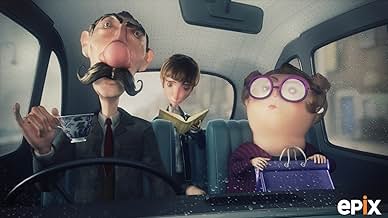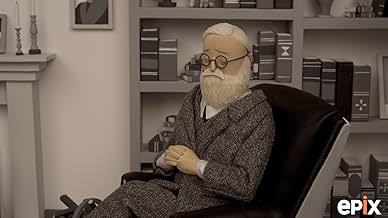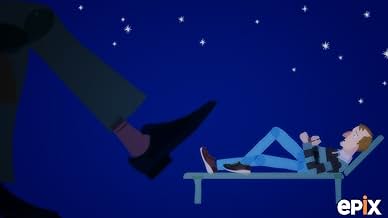IMDb RATING
5.9/10
1.9K
YOUR RATING
An animated, factually incorrect biography of Graham Arthur Chapman, one of the founding members of the comedy group Monty Python.An animated, factually incorrect biography of Graham Arthur Chapman, one of the founding members of the comedy group Monty Python.An animated, factually incorrect biography of Graham Arthur Chapman, one of the founding members of the comedy group Monty Python.
- Directors
- Writers
- Stars
Graham Chapman
- Graham Chapman
- (voice)
- …
John Cleese
- John Cleese
- (voice)
- …
Terry Jones
- Terry Jones
- (voice)
- …
Michael Palin
- Michael Palin
- (voice)
- …
Terry Gilliam
- Interview Don #2
- (voice)
- …
Carol Cleveland
- Masseuse
- (voice)
- …
Philip Bulcock
- David Sherlock
- (voice)
Stephen Fry
- Oscar Wilde
- (voice)
Lloyd Kaufman
- Uncle Lloyd
- (voice)
Cameron Diaz
- Seigmund Freud
- (voice)
Ronnie Corbett
- Thompson
- (archive footage)
- (uncredited)
David Frost
- Self
- (archive footage)
- (uncredited)
- Directors
- Writers
- All cast & crew
- Production, box office & more at IMDbPro
Featured reviews
This is a very naughty movie. Many times I said to myself, "Did I just see what I thought I just saw? No, it couldn't be." It celebrates anuses, penises, anal sex, 69, promiscuity, alcoholism and death. The animation is very cleverly done to give you the subjective impression of seeing the world from inside Graham Chapman's head. Everything just sort of flows, the way ideas flow.
There is one big catchy musical number with words that summarises the cheeky raunchiness:
Sit on my face and tell me that you love me
I'll sit on your face and tell you I love you too
I love to hear you oralize
When I'm between your thighs
You blow me away
Sit on my face and let my lips embrace you
I'll sit on your face and then I'll love you truly
Life can be fine if we both sixty nine
If we sit on our faces in all sorts of places
And play till we're blown away
There is one big catchy musical number with words that summarises the cheeky raunchiness:
Sit on my face and tell me that you love me
I'll sit on your face and tell you I love you too
I love to hear you oralize
When I'm between your thighs
You blow me away
Sit on my face and let my lips embrace you
I'll sit on your face and then I'll love you truly
Life can be fine if we both sixty nine
If we sit on our faces in all sorts of places
And play till we're blown away
Graham Chapman was erratic, flamboyant and, so close friends attest, somewhat unknowable. Before his death in 1989, The comic and Monty Python member completed a bizarre book full of his singular humour, formative experiences recounted in typically skewed fashion, surreal fabrications, and hints towards his struggle with alcohol (he was known to drink several pints of gin daily).
As animation producer Justin Weyers disclosed during the aforementioned workshop, the production team, headed by directors Bill Jones, Jeff Simpson and Ben Timlett, required a certain scope and diverse approach to do justice to the subject matter. What resulted is a patchwork of various animation methods from fourteen different creative teams, helped along the way by vocal contributions from the Pythons, and sewn together with occasional film and interview clips.
The film leaps briskly between animation methods, including cell techniques and stop motion, all converted into stereoscopic 3D. This may sound a jarring and disparate visual style, and it sometimes is. But the piece is helped enormously by the audio narration Chapman recorded of his book, which ties the threads together and drives the whole thing along. There is a clear standout aesthetic, achieved by oil painting every frame onto glass. Wielding rich, textured results, this visual style illustrates the darkest portion of the film, concerning Chapman's attempts to confront his alcoholism. These scenes were so striking it's almost a shame when the section utilising this method drew to a close, other animation styles seeming comparatively flat.
Other highlights arrive in the form of recounted Python meetings in which the comics are for some reason reimagined as monkeys, comically graphic sex scenes, and surreal flights which variously find the comedian wandering around space, and sipping spirits with the Queen. There's an evident attention to craft throughout.
As to be expected from this sort of project, there are sections which don't work as well as others. A stern talking to from a stop motion Sigmund Freud, voiced by Cameron Diaz (who else), is a disappointingly dry episode. On the whole, this is a camp and absurd, sensitively crafted film, at turns irritating, but ceaselessly creative; a fitting tribute to an unpredictable, distinct talent.
www.theframeloop.com
As animation producer Justin Weyers disclosed during the aforementioned workshop, the production team, headed by directors Bill Jones, Jeff Simpson and Ben Timlett, required a certain scope and diverse approach to do justice to the subject matter. What resulted is a patchwork of various animation methods from fourteen different creative teams, helped along the way by vocal contributions from the Pythons, and sewn together with occasional film and interview clips.
The film leaps briskly between animation methods, including cell techniques and stop motion, all converted into stereoscopic 3D. This may sound a jarring and disparate visual style, and it sometimes is. But the piece is helped enormously by the audio narration Chapman recorded of his book, which ties the threads together and drives the whole thing along. There is a clear standout aesthetic, achieved by oil painting every frame onto glass. Wielding rich, textured results, this visual style illustrates the darkest portion of the film, concerning Chapman's attempts to confront his alcoholism. These scenes were so striking it's almost a shame when the section utilising this method drew to a close, other animation styles seeming comparatively flat.
Other highlights arrive in the form of recounted Python meetings in which the comics are for some reason reimagined as monkeys, comically graphic sex scenes, and surreal flights which variously find the comedian wandering around space, and sipping spirits with the Queen. There's an evident attention to craft throughout.
As to be expected from this sort of project, there are sections which don't work as well as others. A stern talking to from a stop motion Sigmund Freud, voiced by Cameron Diaz (who else), is a disappointingly dry episode. On the whole, this is a camp and absurd, sensitively crafted film, at turns irritating, but ceaselessly creative; a fitting tribute to an unpredictable, distinct talent.
www.theframeloop.com
Well I have to say that I was rather disappointed with this film. It comes across as disjointed and of varying levels of quality. It certainly never reaches anything like the standards of entertainment of the old Monty Python stuff. Mind you I suppose it is clear that it doesn't set out to or pretend to do that. It is, after all, a film based on Graham Chapman's autobiography.
I did read this book many years ago – in part because I and some friends met the man himself back in 1974, and we spent a rather drunken evening together in the bar at the Kingshouse in Glencoe. This episode even gets a mention in the book (page 218), although not in the film; so I have some first hand knowledge of what he was like.
Essentially I reckon the book is an honest and accurate insight into Chapman's life (despite the title), and the film comes across as a project based on the book. The film does some things reasonably well, but mostly it looks like the producers simply farmed out sections of the book to several different groups of students (or maybe recent graduates) of media studies or animation, and then stuck them together using odd snippets of Chapman's own reading of the book.
I watched the film on DVD and found the "additional material" to be considerably more watchable than the film itself, particularly some old 8mm film and the "behind the scenes" stuff on the way the animation scenes were produced!
I did read this book many years ago – in part because I and some friends met the man himself back in 1974, and we spent a rather drunken evening together in the bar at the Kingshouse in Glencoe. This episode even gets a mention in the book (page 218), although not in the film; so I have some first hand knowledge of what he was like.
Essentially I reckon the book is an honest and accurate insight into Chapman's life (despite the title), and the film comes across as a project based on the book. The film does some things reasonably well, but mostly it looks like the producers simply farmed out sections of the book to several different groups of students (or maybe recent graduates) of media studies or animation, and then stuck them together using odd snippets of Chapman's own reading of the book.
I watched the film on DVD and found the "additional material" to be considerably more watchable than the film itself, particularly some old 8mm film and the "behind the scenes" stuff on the way the animation scenes were produced!
I'm a big Monty Python fan but I haven't yet read A Liar's Autobiography (Volume VI).
I was very disappointed with the film as it lacks any of the Monty Python charm. It feels more like a Spike Milligan book, but lacking that crucial, undefinable charm which draws you into a madman's world. It only made me wistful to watch some actual Monty Python. However there is somewhat of a spooky feel in that the film is narrated by Graham Chapman himself, who became an ex parrot in 1989.
The film is mostly animated using multiple styles of animation. Fans of Terry Gilliam animation will be disappointed to see a lack of this style though. There are a number of very crude jokes and references in this film, again lacking the charm to make them truly funny.
The film is somewhat reminiscent of the film Yellow Submarine (1968) and perhaps a sober state of mind is not recommended when watching this film. I highly recommend the Spike Milligan novels as well as any of the Monty Python films or shows.
I was very disappointed with the film as it lacks any of the Monty Python charm. It feels more like a Spike Milligan book, but lacking that crucial, undefinable charm which draws you into a madman's world. It only made me wistful to watch some actual Monty Python. However there is somewhat of a spooky feel in that the film is narrated by Graham Chapman himself, who became an ex parrot in 1989.
The film is mostly animated using multiple styles of animation. Fans of Terry Gilliam animation will be disappointed to see a lack of this style though. There are a number of very crude jokes and references in this film, again lacking the charm to make them truly funny.
The film is somewhat reminiscent of the film Yellow Submarine (1968) and perhaps a sober state of mind is not recommended when watching this film. I highly recommend the Spike Milligan novels as well as any of the Monty Python films or shows.
A Liars Autobiography is a celebration of the life of the elusive and eccentric Graham Chapman. The film is narrated by Chapman himself (he had recorded audio tapes of his memoirs) and the animation alone is a visual feast. It varies in style which suggests that aside from the obvious comedy, the film is much more perceptive and sophisticated than on first glance.
Chapman led a surreal life and was known by the people that knew him as anything but one dimensional. The film depicts just that as well as the reality that perhaps Chapman himself didn't really know who he was. The sequence I most enjoyed was the one depicting Chapman's alcohol withdrawal symptoms, handled with sensitivity and complemented by the eerie & Burton-Esq animation of insects crawling around Chapman whilst he lies in bed, this is a sequence that adds yet another layer to Chapman's identity.
You don't need to be a Monty Python fan to appreciate this film; its sheer brilliance lies in the animation and it's psychedelic depiction of one of the most iconic Pythons. A pleasurable watch, highly recommend.
Chapman led a surreal life and was known by the people that knew him as anything but one dimensional. The film depicts just that as well as the reality that perhaps Chapman himself didn't really know who he was. The sequence I most enjoyed was the one depicting Chapman's alcohol withdrawal symptoms, handled with sensitivity and complemented by the eerie & Burton-Esq animation of insects crawling around Chapman whilst he lies in bed, this is a sequence that adds yet another layer to Chapman's identity.
You don't need to be a Monty Python fan to appreciate this film; its sheer brilliance lies in the animation and it's psychedelic depiction of one of the most iconic Pythons. A pleasurable watch, highly recommend.
Did you know
- TriviaThe audio under the opening credits is from a sketch Chapman regularly used to perform, where he asked a live audience at the start of the show to give him "thirty seconds of abuse", as this saved time later on. For this movie, specially recorded abuse was added from John Cleese, Sir Michael Palin, Terry Jones (shouting Medieval curse words), Terry Gilliam, Carol Cleveland, and David Sherlock, Chapman's former partner. One of the investors in this movie can also be heard shouting "I want my f**king money back!"
- GoofsSigmund Freud's name is misspelled as "Seigmund Freud" in the opening title sequence and closing credits.
- ConnectionsFeatured in De wereld draait door: Episode #8.126 (2013)
- Soundtracks633 Squadron
Written by Ron Goodwin
(P) EMI Partnership Ltd
Performed by Central Band of the Royal Air Force (as The Central Band of the RAF) with Principle Director of Music Wing Commander H. B. Hingley MBE
Produced by Roberto Danova
Supplied by kind permission of PLAZA Records Ltd
Details
- Release date
- Country of origin
- Official sites
- Language
- Also known as
- Graham Chapman: Dead in 3-D
- Production companies
- See more company credits at IMDbPro
Box office
- Gross US & Canada
- $5,102
- Opening weekend US & Canada
- $5,102
- Nov 4, 2012
- Gross worldwide
- $63,469
- Runtime1 hour 25 minutes
- Color
- Aspect ratio
- 1.85 : 1
Contribute to this page
Suggest an edit or add missing content

Top Gap
By what name was A Liar's Autobiography: The Untrue Story of Monty Python's Graham Chapman (2012) officially released in India in English?
Answer




































